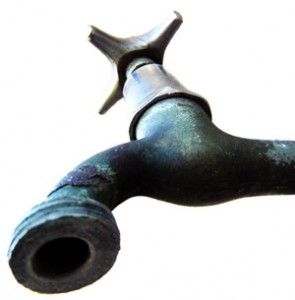 In May 2000, Fortune magazine published an article on the financial benefits — benefits for corporations and investors, that is — of privatized water. (emphasis added)
In May 2000, Fortune magazine published an article on the financial benefits — benefits for corporations and investors, that is — of privatized water. (emphasis added)
From Buenos Aires to Atlanta to Jakarta, the liquid everybody needs–and will need a lot more of in the future — is going private, creating one of the world’s great business opportunities. The dollars at stake are huge. Supplying water to people and companies is a $400-billion-a-year industry. That’s 40% of the size of the oil sector and one-third larger than global pharmaceuticals. And this is just the beginning. The World Bank estimates that one billion people, one-sixth of humanity, have poor access to clean drinking water, and three billion lack sanitary sewage facilities. Unless governments begin spending much more, the number of people without clean water will rise to 2.5 billion, about one person in three, by the year 2025. …
Water promises to be to the 21st century what oil was to the 20th century: the precious commodity that determines the wealth of nations. … Elizabeth Mackay, chief investment strategist at New York investment house Bear Stearns, calls water “the best sector for the next century.” …
So far [the French company] Suez has had a leg up on its rivals because it understands what’s really needed to turn plain water into big money. … “Where else can you find a business that’s totally international, where the prices and volumes, unlike steel, rarely go down?” he [CEO of Suez, Gerard Mestrallet] argues. …
Here’s how deals work in the developing world. … To turn a profit, it [Suez] must collect far more in water charges than it pays out in salaries, equipment, and interest.
Water privatization is here to stay
Ten years later, water privatization – both in developing countries and the US – is here to stay. A 2006 estimate from the UN predicted that two out of three people could be living under conditions of “water stress.” The US uses ground water 25 per cent faster than it can be replenished.
The city of Atlanta privatized its water supply in the late 1990s, but changed its mind after four years. Service was “spotty” and the rate increases were “significant.”
In these difficult economic times, however, many cash-strapped cities are contemplating the sale of their water and sewage systems as they attempt to close their budget deficits. The impetus comes from the deteriorating condition of the nation’s water systems, discussed in a recent New York Times editorial.
Aging and corroded pipes are bursting somewhere every couple of minutes. Dilapidated sewer systems are contaminating waterways and drinking water. Many local systems are so old and inadequate — in some cases, so utterly rotten — that they are overwhelmed by heavy rain.
The American Society of Civil Engineers gave the nation’s water systems a grade of D-minus and told the Times:
We’re relying on water systems built by our great-grandparents, and no one wants to pay for the decades we’ve spent ignoring them. There’s a lot of evidence that people are getting sick. But because everything is out of sight, no one really understands how bad things have become.
What follows in subsequent posts is a quick look at the privatization of water in other countries (Bolivia and South Africa), an explanation of the economic philosophy behind privatization (neoliberalism), and – my ultimate interest here — the connection between neoliberalism and the emphasis on personal responsibility for health in recent US history.
Related posts:
The tyranny of health
Déjà vu: Historical resistance to the inequities of health
Health inequities: An inhumane history
Health care inequality: The US vs. Europe
Why did we shoot ourselves in the foot on health care?
Resources:
Image source: Food & Water Watch
Shawn Tully, Water, Water Everywhere, Fortune, May 2000
Amy Merrick, Cash Flows in Water Deals, The Wall Street Journal, September 2, 2010
Bob Herbert, The Corrosion of America, The New York Times, October 26, 2010


I never considered water infrastructure being as deteriorated as bridges and highways. But it makes sense. I would hate, and would fight against, the privatization of our water supply.
In this bad economy with unemployment so high, is it possible to upgrade our pipes with some of the unemployed? Put them to work on something we need fixed for a fair wage? Or is that too romantic and too old politics?
I am reminded of John W. Gardner’s (JFK’s HHH Secretary) excellent quote:
“The society which scorns excellence in plumbing as a humble activity and tolerates shoddiness in philosophy because it is an exalted activity will have neither good plumbing nor good philosophy: neither its pipes nor its theories will hold water.”
Doesn’t really fit this topic to a “T.” But it speaks to where America is right now, I think.
That’s exactly what we need, and it is being talked about – not water systems in particular, but infrastructure. Let’s hope that, with the election over, both sides can agree to create jobs by investing in the long term needs and interests of the country.